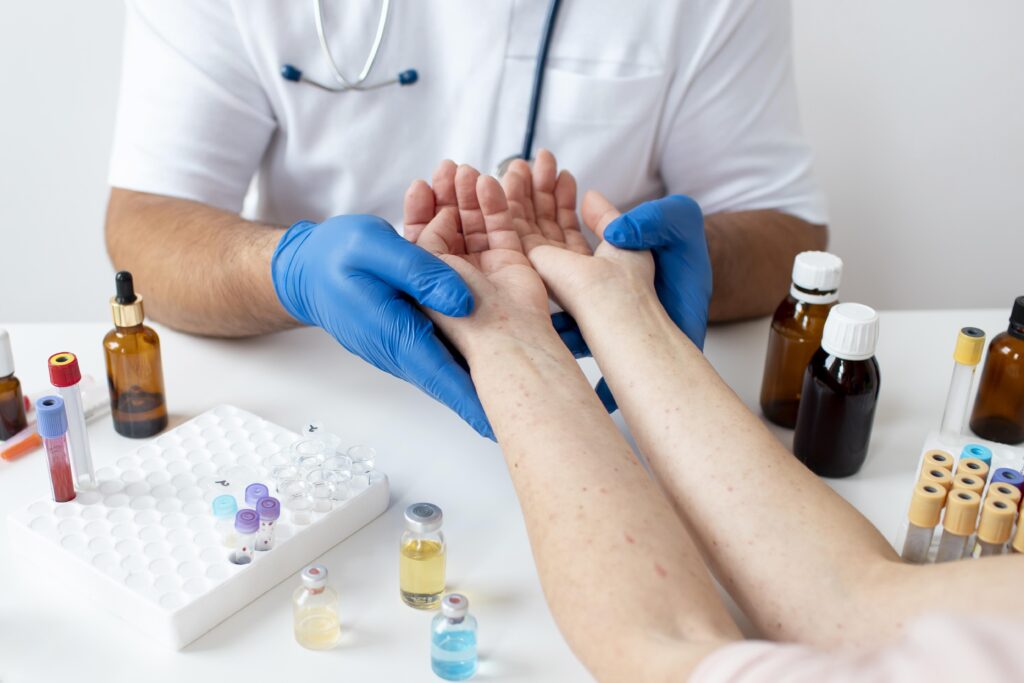- drambalkar@yahoo.co.in
- Mon - Sunday 10:00 AM - 02:00 PM
Questions to Ask Your Doctor About Psoriasis
Receiving a diagnosis of psoriasis, a chronic skin disease, may be challenging, but it’s a crucial step towards managing the condition effectively. Understanding your condition empowers you to make informed decisions to improve your health. As you navigate this journey, consider asking your doctor these 8 essential questions during your next appointment.

Below are some of the questions you should Ask Your Doctor About Psoriasis
1. What type of psoriasis do I have?
Psoriasis is characterized by skin inflammation and scaling, with various types that exhibit distinct appearances. The severity of psoriasis can vary, affecting different parts of the body and impacting one’s life differently. Understanding your specific type of psoriasis is crucial for successful management and coping with its effects.
2. Which treatment is best for me?
Psoriasis treatment offers a wide range of options, such as creams, ointments, pills, and injections, with light therapy sometimes proving beneficial. However, the effectiveness of these treatments can vary from person to person and even within the same individual at different times. It’s essential to understand that medications are just one aspect of a comprehensive Ayurvedic psoriasis treatment plan. Your doctor may recommend combining different approaches to achieve the best results for managing your condition.
3. What are the risks of my treatment?
Psoriasis treatments carry varying risks, including skin irritation with topical options, increased infection risk with systemic medications, and sunburn-like reactions with phototherapy. Discuss these risks with your ayurvedic skin specialist to ensure a suitable and safe treatment plan for your condition.
4. What can I do about the itching?
Itching is a significant concern for individuals with psoriasis, as it can have a more profound impact than simply being an annoyance. The urge to scratch affected skin can lead to the development of new psoriasis patches or worsen existing ones. Managing itching becomes crucial to prevent further aggravation of the condition. Fortunately, several remedies can help alleviate itching and provide relief. Moisturizers play a vital role in keeping the skin hydrated and reducing itchiness. Applying cold packs to affected areas can also offer a soothing effect and temporarily relieve itching sensations. By addressing itching proactively, individuals with psoriasis can potentially minimize the risk of exacerbating their condition and improve their overall quality of life.
5. Once my psoriasis has cleared up, will it come back?
Psoriasis can exhibit periods of improvement followed by flare-ups, and treatments that were effective in the past may become less so over time, necessitating adjustments to your treatment plan. It is crucial to recognize when changes occur in your condition and to promptly reach out to your doctor. Regular communication with your healthcare provider will help ensure that your psoriasis is effectively managed and that appropriate modifications are made to the treatment approach whenever necessary.
6. How should I care for my skin every day?
Maintaining a proper skincare routine is vital to keep your skin soft and prevent dryness, which can lead to itching. Your doctor is an excellent source of skin care advice tailored to your specific needs. Adopting smart tips such as limiting alcohol consumption and finding stress-reduction techniques can contribute to healthier skin. If you smoke, quitting is beneficial for both your overall health and your skin. Additionally, the National Psoriasis Foundation (NPF) and the American Academy of Dermatology are reliable sources of helpful advice and valuable resources for managing psoriasis and maintaining skin health.
7. How does sunlight affect my skin?
For many individuals with psoriasis, short and nonburning exposures to sunlight can have beneficial effects on their condition. However, it’s essential to be cautious, as a sunburn can trigger a psoriasis flare-up, and certain treatments may increase skin sensitivity to the sun. To ensure safe sun exposure, it is crucial to consult with your doctor. They can advise you on whether daily sun exposure is suitable for your specific situation and provide guidance on how to avoid overdoing it. By understanding the right balance of sun exposure, you can potentially harness its positive effects while safeguarding your skin health and managing psoriasis effectively.
8. Is psoriasis related to any other health problems?
Individuals with psoriasis face an elevated risk of heart disease, inflammatory bowel disease, and diabetes. To ensure comprehensive care, it is essential for your dermatologist and primary care provider to communicate with each other regarding your overall health. You can play an active role in facilitating this dialogue. Engage in discussions with your doctors about adopting healthy lifestyle choices and scheduling recommended screenings to effectively manage and address potential health concerns associated with psoriasis. By collaborating with your healthcare team, you can take proactive steps to safeguard your well-being and enhance your quality of life.
Conclusion:
Receiving a diagnosis of psoriasis may be challenging, but understanding your condition empowers you to take control of your health. By asking essential questions and having open communication with your ayurvedic skin specialist doctor, you can make informed decisions about your treatment and care. Remember to discuss the type of psoriasis you have, the best treatment options, and potential risks involved. Addressing itching proactively and maintaining a proper skincare routine can significantly improve your quality of life. Be mindful of sunlight exposure, as it can have both positive and negative effects on your skin. Lastly, recognize the link between psoriasis and other health problems, and collaborate with your healthcare team to address any concerns. By staying informed and proactive, you can effectively manage your psoriasis and lead a fulfilling life with better health and well-being.

Get in Touch with us Today to Begin Your Journey of Transformation

Contact Us
- Dr.Ambalkars Aayurvedic Research Centre, ARC Bhavan, Vijay Vihar Complex, Evershine City, Last Stop, Vasai (E)
- drambalkar@yahoo.co.in
- +91 9320193201
- +91 9766362776

